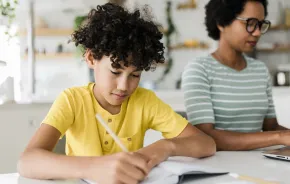We want our children to develop close relationships with their peers, and we often go to special lengths to help move that process forward. Take the play date, for example. If two girls bond consistently on the playground, their parents might find themselves sipping coffee together in one of their homes, while the girls explore their relationship in a more intimate setting.
Yet because the girls will be using this time to discover and practice vital social skills, their parents will likely be disappointed if they expect the entire play date to go smoothly. "Those first friendships are so important," says Sara Barbee, who teaches at the Rainier Valley Cooperative Preschool. "But their ability to get along is not going to be the same at all times. Parents should expect both the best and the worst on a play date, and hopefully have the flexibility to deal with whatever situation comes up."
When conflicts do arise, they often involve sharing or taking turns. "There are moments where they're unbelievably thoughtful," says Sarah Greene of Seattle, whose son Dylan is 3, "and other times where they really want to hold on tight (to an object) and even create a bit of an incident."
Brett McCallum of Seattle, whose son Roan is also 3, agrees. "Some days a friend could pick up anything and he instantly wants that thing. But on other days he may pick something up and offer it to his friend. It's often two steps forward, one step back."
McCallum adds that he likes to keep two sets of certain toys on hand for Roan's play dates. "If he's going to a friend's house, he'll often want to bring something, and I'll suggest bringing two of them in case the other child wants to play with it too."
Sharing at one's own home can be particularly challenging. "A child's own toys are like an extension of themselves and their world," Barbee says. She suggests asking the child before the play date if he would like to put his favorite toys away. "You empower the child to decide how he wants to handle the issue," she says. "He may opt to leave them out, but then if it becomes a problem later, the parent might say, 'Remember when we talked about this earlier? Would you like to put the toys away now?'"
Susan Gibbons of Mercer Island, whose twins Anders and Tate are 4, says, "Even at this age, there's a glimmer of sharing, but it's not great." She likes to have a back-up activity ready in case things start to deteriorate. "I'll buy pre-made cookie dough and have the kids roll it out and decorate it, or even simple art projects like paper plate faces where they'll glue on eyes, noses and mouths, and then we'll do parades."
The Gibbons also have a set of rules that they review before play dates: "Listen to other people, or think of other people's feelings; no whining and keep your hands to yourself." She adds, "I usually have to stop them if they're whining and say: 'Boys, what's rule #2?' Or just quietly pull them aside and remind them of the rules."
Because children are also learning what it means to have -- and resolve -- conflicts, it can be difficult to find a balance between too much parental involvement and not enough. "The kids need an opportunity to break the ice without a grown-up interfering," Barbee says. But she also suggests that it would probably be a rare play date where a parent doesn't have to referee at least once. "More than anything, parents can help by redirecting energy: offering a different solution or idea when problems arise."
Again, Barbee emphasizes flexibility and modest expectations. "There may even be times during a play date when one child decides he no longer wants to play with the other child, and that's okay. They don't necessarily have to be playing together the entire time."™
Laura Fine-Morrison is a mother and a Seattle-based freelance writer.









